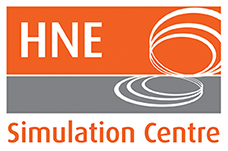ICU Education
BASIC Course
The Basic Assessment and Support in Intensive Care (BASIC) Course was designed to teach participants the fundamentals of rapid assessment and initial supportive treatment of critically unwell patients. BASIC is run at JHH twice per year, and attracts applicants from across Australia and New Zealand.
Paediatric BASIC Course
The Basic Assessment and Support in Intensive Care (BASIC) Course was designed to teach participants the fundamentals of rapid assessment and initial supportive treatment of critically unwell paediatric patients. Paeds BASIC is run at JHH annually, and attracts applicants from across Australia and New Zealand.
Beyond BASIC Mechanical Ventilation
The BBMV Course is run every other year and is an advanced course focusing of the mechanics and approach to troubleshooting difficult ventilation.
Cardiac Surgery Advanced Life Support (CALS) Course
John Hunter Hospital is one of the Australian “centres of excellence” offering doctors and nurses the opportunity to undertake the internationally renowned CALS course. Originating from the UK, this course offers an online pre-reading module before a consolidating the learning with a full day of lectures, workshops and simulation sessions. The objective of the course is to empower practitioners to act with confidence to better treat critically ill patients using validated protocols and to safely manage the patient until expert help arrives.
The course is taught in the HNE Simulation Centre by a strong faculty of doctors and nurses from all the relevant disciplines – ICU, anaesthetics and cardiac surgery. CALS has been very well received and has been the model for our unit's post-operative cardiac surgery guideline. The unit organises two-three CALS courses per year, and attendees will be accredited for two years and can use the course towards their CME/CPD points. For more information, visit https://www.csu-als.com/
ICU Crisis Team Training Course
This course provides scenario based team training on the types of adult emergencies that staff may encounter within the ICU or during a rapid response call. This course is run every 3 months for staff working in ICU.
Difficult Airway Management Course
This course focuses on the management and process of dealing with a difficult airway in the adult patient. The course comprises airway skills stations and scenario based team training. Run every 3 months for staff working in ICU.
Paediatric ICU Crisis Team Training Course
This course provides scenario based team training on the types of paediatric emergencies that staff may encounter within the paediatric ICU or during a paediatric rapid response call. Run every 3 months for staff working in Paediatric ICU.
Basic Critical Care Transthoracic Echocardiography course
The Basic Critical Care Transthoracic Echocardiography course at the John Hunter Hospital was started in March 2012. Initially run over 2 half days, one week apart, it was amalgamated into an intensive full day course following accreditation for
Basic Echocardiography Training as part of the curriculum for trainees for the College of Intensive Care Medicine. The John Hunter Course is accredited by the CICM.
The aim of the course is to equip trainees with basic theory and the practical skills required to perform a targeted critical care study.
Pre-course reading is a component of the course. The total contact time is 8 hours, of which 5 hours are spent scanning.
The focus of the course is on practical sessions. The course size is limited to 10 participants to maximise scanning time. It is expected that participants will take the skills learned back to their institutions and continue scanning. Competency in echocardiography can only be achieved and maintained by ongoing practice and education.
An image bank, of both normal findings and pathology, is provided to course participants as is a list of resources to enable them to extend their skills. Accreditation and maintenance of standards are difficult aspects of critical care echocardiography that are discussed.
Critical care trainees need to understand the role of echocardiography in critical care medicine and be able to perform and interpret and an emergency scan targeted to look for certain patterns of acute pathology – right heart failure, left ventricular systolic failure, large pericardial effusion, gross valvular regurgitation and hypovolaemia. These patterns, and differentiating them from a normal scan, are emphasised.
This course will equip you with the skills and knowledge to begin supervised ECHO practice in your clinical work.
Course enquiries
For all course enquiries email HNELHD-JHHICUCourses@health.nsw.gov.au
Primary Exam
The JHH ICU provides a comprehensive teaching program for the CICM primary exam. The CICM Primary Teaching sessions run on every week Thursday evenings at 1730 and cover the syllabus over the course of ~ 3months. Each year we have 2-6 trainees sitting the CICM Primary, which benefit from studying together as a cohort of colleagues and friends.
Most trainees attend for the 12 months prior to their exam, and benefit from a spiral learning approach to the exam. This also enables new trainees wishing to start studying for the exam to join the tutorials at any stage.
Formal mock viva sessions and practice written exams are held every 6 months, and John Hunter Hospital ICU trainees have enjoyed a high success rate at the primary exam over the past decade.
Simulation
We recognise that our staff are our greatest asset, and we invest in their education. The John Hunter Intensive Care Unit uses simulation training as an integral part of our education program. We are supported in delivering this training by the HNE Simulation Centre team.
Each term we run the following specialised intensive care simulation courses for medical and nursing staff working in the ICU (a total of 12 courses per year):
- Intensive Care Crisis Team Training
This course provides scenario based team training on the types of adult emergencies that staff may encounter within the ICU or during a rapid response call.
- ICU Difficult Airway Management
This course focuses on the management and process of dealing with a difficult airway in the adult patient. The course comprises airway skills stations and scenario based team training.
- Intensive Care Paediatric Crisis Team Training
This course provides scenario based team training on the types of paediatric emergencies that staff may encounter within the paediatric ICU or during a rapid response call.
These inter-professional team training courses are specifically designed to provide participants with specialised skills training and allow them to practice their communication, leadership, decision-making and resource management skills.
There is no cost to John Hunter ICU staff to attend these courses – they are funded by the Department of Intensive Care to ensure our medical and nursing staff have access to the best training and professional development opportunities available.
Our unit enjoys working collaboratively with the HNE Simulation Centre. This is a state-of-the-art educational facility that delivers training to several thousand participants each year. The centre is supported by a team of specialist doctors and senior nurses who are trained simulation instructors and clinically active in the specialty areas of anaesthesia, intensive care (adult, paediatric & neonatal) and emergency medicine.

Weekly Teaching
A comprehensive weekly teaching program is run to cover the educational requirements of our doctors and nurses.
- Tuesday 12pm - PICU Case Discussion - Lvl 3 PICU
- Tuesday 2pm – Core ICU Practical Skills
- In-situ simulation and practical skills multidisciplinary teaching for junior doctors and nursing staff
- Wednesday 9-11am - Fellowship Teaching for Advanced Trainees with written exam and hot case practice weekly
- Wednesday 12:30pm Journal Club or ECHO teaching
- Wednesday 2pm ICU Grand Rounds
- Thursday 7am Neurocritical Care Grand Rounds Multidisclipinary Team Meeting - Lvl 4 PICU
- Thursday 2pm Core PICU Practical Skills
- In-situ Paediatric ICU simulation and practical skills multidisciplinary teaching for junior doctors and nursing staff (open to all ICU staff and all John Hunter Children's Hospital staff)
- Friday 7am Trauma Forum - Lvl 3 RNC Lecture Theatre
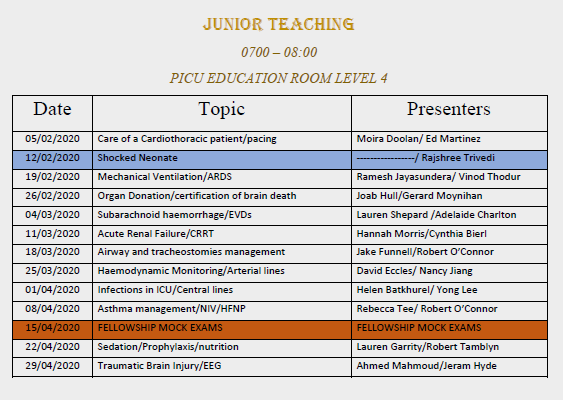
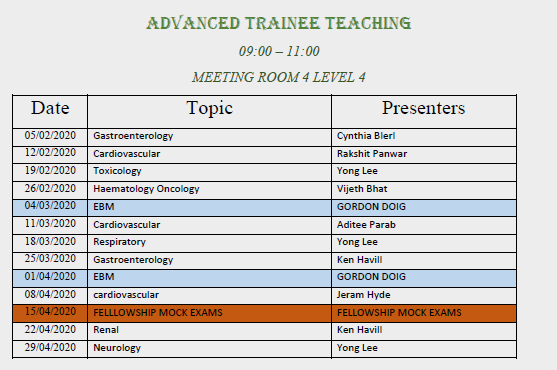
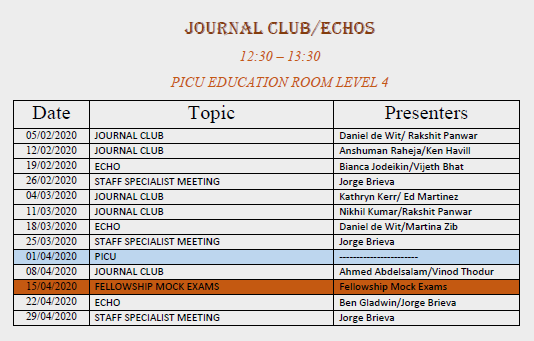
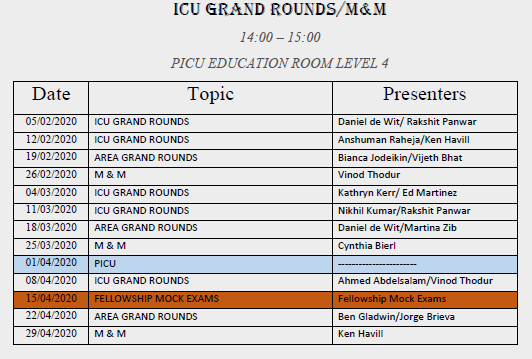
Fellowship Exam
The John Hunter ICU has a well-established and comprehensive teaching program for the CICM fellowship examinations which has seen high pass rates over the past decade.
Our staff are highly trained, skilled and motivated and able to practice across the entire domain of Intensive Care medicine. To compliment the broad clinical experience ICU trainees receive at JHH, we provide weekly protected teaching sessions focused on preparation for all three components of the fellowship examination: written, hot cases and vivas.
The John Hunter Hospital ICU is able to provide regular hot cases in General ICU, Neurosurgery, Cardiothoracic, Trauma, ECMO, ENT, Maxillary-Facial Surgery, Severe Respiratory Failure, General Surgery, Interventional Neurology, and candidates are able to undertake Haematology/Oncology cases at the nearby Calvary Mater Hospital ICU.
Additionally there are formal mock exam days every 6 months. This gives candidates the opportunity to perform written, viva and hot cases all under exam conditions with individualised candidate feedback.
We usually have between 2-7 candidates sitting the fellowship exam each year, and they benefit from being able to study together as a group.
Echocardiography Teaching Program
There is an active echocardiography teaching program in the John Hunter Hospital Intensive Care Unit.
Our Basic Critical Care Echocardiography Course is accredited by the CICM and a number of our staff specialists are CICM accredited Critical Care Echocardiography Assessors.
Trainees who stay with us for a longer period of time are encouraged to achieve internal accreditation in basic echocardiographic haemodynamic assessment (Level 1).
In brief, this process involves attending our course, performing and reporting targeted critical care echoes, and participating in second weekly echo meetings. Trainees are provided with regular teaching with patients as well as a transthoracic and transoesophageal simulation manikin. A number of staff specialists are keen sonographers, so there are many teaching opportunities available.

